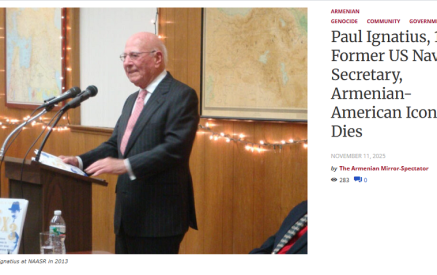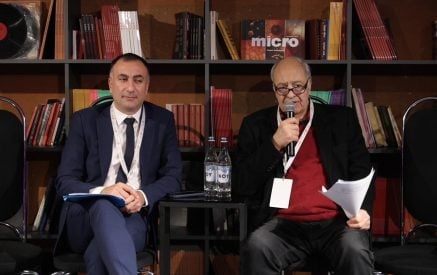By Harut Sassounian
Publisher, The California Courier
As the publisher of a newspaper, I frequently receive what is supposed to be factual ‘news,’ but, after doing some checking, I find out that most of what I was told is baseless rumor.
Read also
A good example of gossip mongering happened last week when Israeli travel blogger and journalist Alexander Lapshin arrived in Los Angeles. His visit generated rumors and hateful words by some Armenians.
For those who are not familiar with Lapshin, he visited Armenia on several occasions and went to Artsakh in 2011 and 2012. Azerbaijan blacklisted him, considering his visit to Artsakh illegal. Pres. Aliyev then asked Belarus in 2016 to arrest and extradite Lapshin to Azerbaijan. After being held in a Belarus jail for two months, Lapshin was sent to Baku on Feb. 7, 2017, on the personal airplane of Pres. Aliyev, where he was put through a sham trial and sentenced to three years in jail. On September 11, 2017, Lapshin was attacked in his prison cell by four masked Azeri agents who broke his jaw, ribs and arm, partially paralyzing him. He spent three days in the intensive care unit of a Baku hospital, after which Pres. Aliyev issued him a pardon and expelled him to Israel, where he spent another two weeks in a hospital. Azeri officials falsely claimed that Lapshin had tried to commit suicide which he strongly denied. Several independent medical examiners confirmed that there was an attempt on Lapshin’s life in Baku.
Ever since his release from jail, Lapshin has toured dozens of countries exposing Azerbaijan’s dictatorial regime and its human rights violations against its own citizens and Armenians in Artsakh.
Contrary to the unfounded rumor that he is an Israeli agent, Lapshin has had a major conflict with the Israeli authorities who repeatedly warned him that if he knows what’s good for him and his family, he should stop criticizing Azerbaijan. Israeli officials described Azerbaijan as ‘an ally of Israel’ and told him that his actions were contrary to Israel’s interests. Lapshin was given the same negative message when he met with American Jewish organizations. Israel also warned Lapshin that his Moldovan wife would not be granted Israeli citizenship unless he stops vilifying Azerbaijan.
Lapshin is currently on a tour of Canada, the United States and Mexico where he is meeting with human rights organizations and elected officials to expose Azerbaijan’s brutal violations and defend the interests of Artsakh Armenians.
My source for this information is neither Lapshin nor his critics. There are two official documents — the European Court of Human Rights and the UN Human Rights Committee — which independently verified the information submitted by both Lapshin and Azerbaijan’s government.
Lapshin filed a complaint against Azerbaijan to the European Court of Human Rights in 2018. The Court, in a 32-page decision in 2021, found credible that Azerbaijan had attempted to murder him and ordered Azerbaijan to pay Lapshin 30,000 euros in compensation, which Azerbaijan has refused to do.
In 2022, the UN Human Rights Committee, in a 10-page report, recognized that Belarus violated several articles of the International Covenant on Civil and Political Rights by arresting and extraditing Lapshin to Azerbaijan, thus putting his life at risk.
Here are some interesting facts from the ruling of the European Court of Human Rights on the case of Lapshin vs. Azerbaijan.
The Government of Azerbaijan falsely told the European Court that Lapshin had written two letters from his Baku hospital allegedly thanking Pres. Aliyev for pardoning him and stating that the prison guards saved his life. Lapshin denied that he wrote these letters. The European Court concluded that Azerbaijan’s allegation is “particularly hard to believe in view of the difficulties which the applicant [Lapshin] had with his writing arm.” Yet there are some Armenians who rather believe Azerbaijan’s lies and forged letters than the European Court’s ruling that there was no reason to doubt Lapshin’s word. The Court also found Lapshin’s assertion ‘plausible’ that there was an attempt to murder him in his Baku prison cell.
The Azeri Judge Latif Huseynov, who was a member of the seven judges assigned to the Lapshin vs. Azerbaijan case, refused to participate. He was replaced by another Azeri Judge, Ceyhun Qaracayev, who voted with the rest of the judges unanimously “in favor of a finding of a violation of Article 2,” which is the ‘Right to Life’ of the European Convention on Human Rights.
In conclusion, those who accuse Lapshin of being a spy without any evidence are alienating a supportive non-Armenian who has risked his life to defend the rights of Artsakh Armenians. This is contrary to the constant Armenian complaint that no one in the world cares about Armenia’s and Artsakh’s destitute situation.




























































